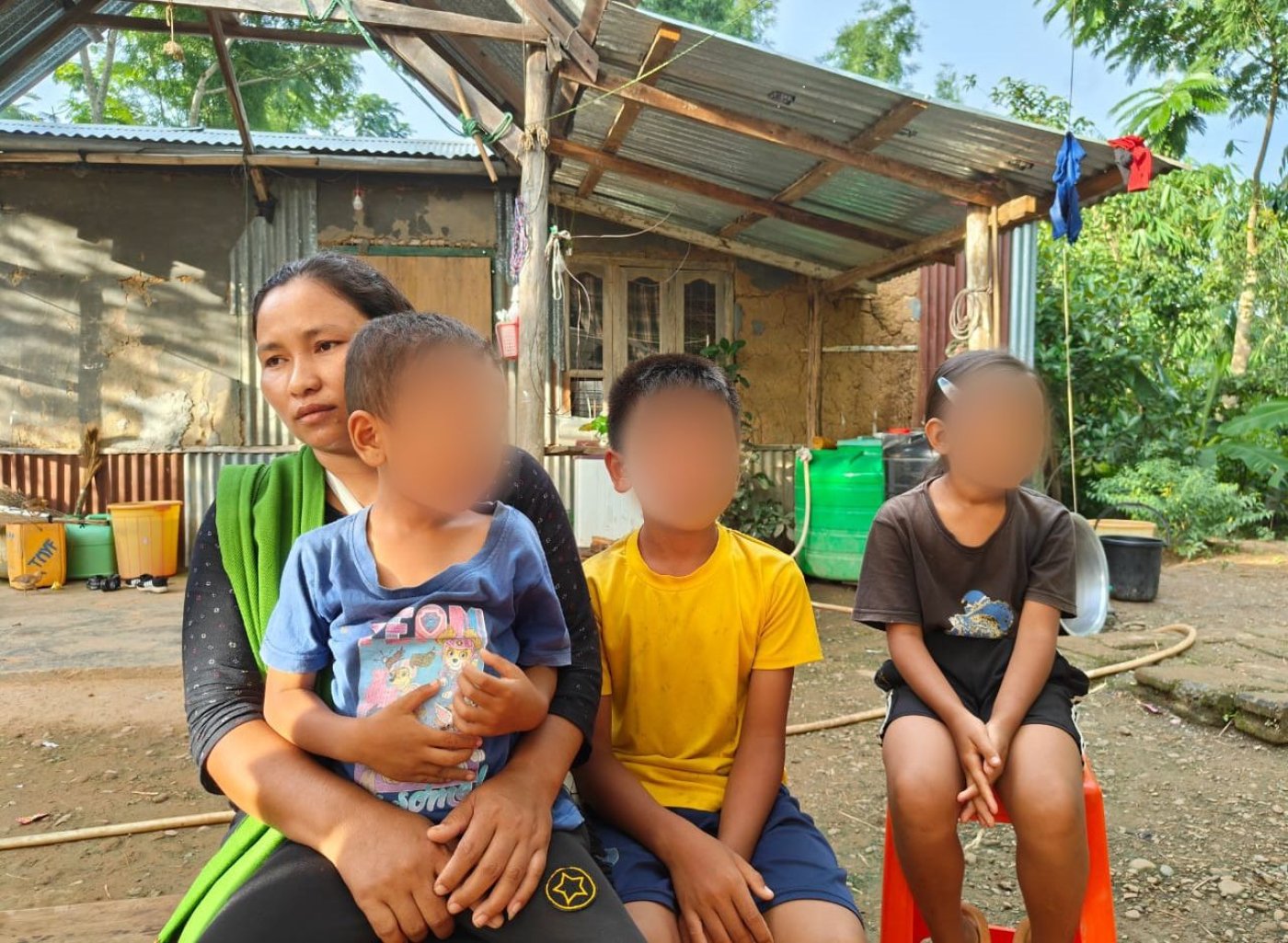Churachandpur, Chandel, Bishnupur & Imphal: Neimnilhing, 38, was waiting for her husband, L S Mangboi Lhungdim, to return and complete the new song he was working on when she heard her 42-year-old partner was killed in an exchange of fire between Meitei and Kuki groups in Manipur.
Before the ethnic violence ravaging the northeastern state for four months, LS Mangboi Lhungdim was a lyricist, composing some romantic but mostly patriotic songs about the tribes of Manipur, which reached hundreds of thousands of people on YouTube.
After the narrative that the predominantly Christian Kukis were from Myanmar grew in Manipur, Lhungdim wrote the tribal anthem, "I gam hilou ham?” (Is this not our land?), which has a million views on YouTube. The notes of his unfinished composition, ‘Unity and Love,’ rest on a dust-covered keyboard of his casio at their home in T Muipha village in Churachandpur, never to be played again.
Over the summer, Lhungdim served as an armed volunteer and assisted in delivering essential supplies like food and medicine. In August, he went to a “frontline” near Khosabung village, between Churchandanpur and Bishnupur districts, around 25 km from his home.
"I know he also must have killed or injured someone on the other side, but what option does he have when standing on a border and facing his enemies?" said Neimnilhing.
In a bout of violence from 29 August to 31 August, eight people—Lhungdim and three other Kukis and four Meiteis—were killed.
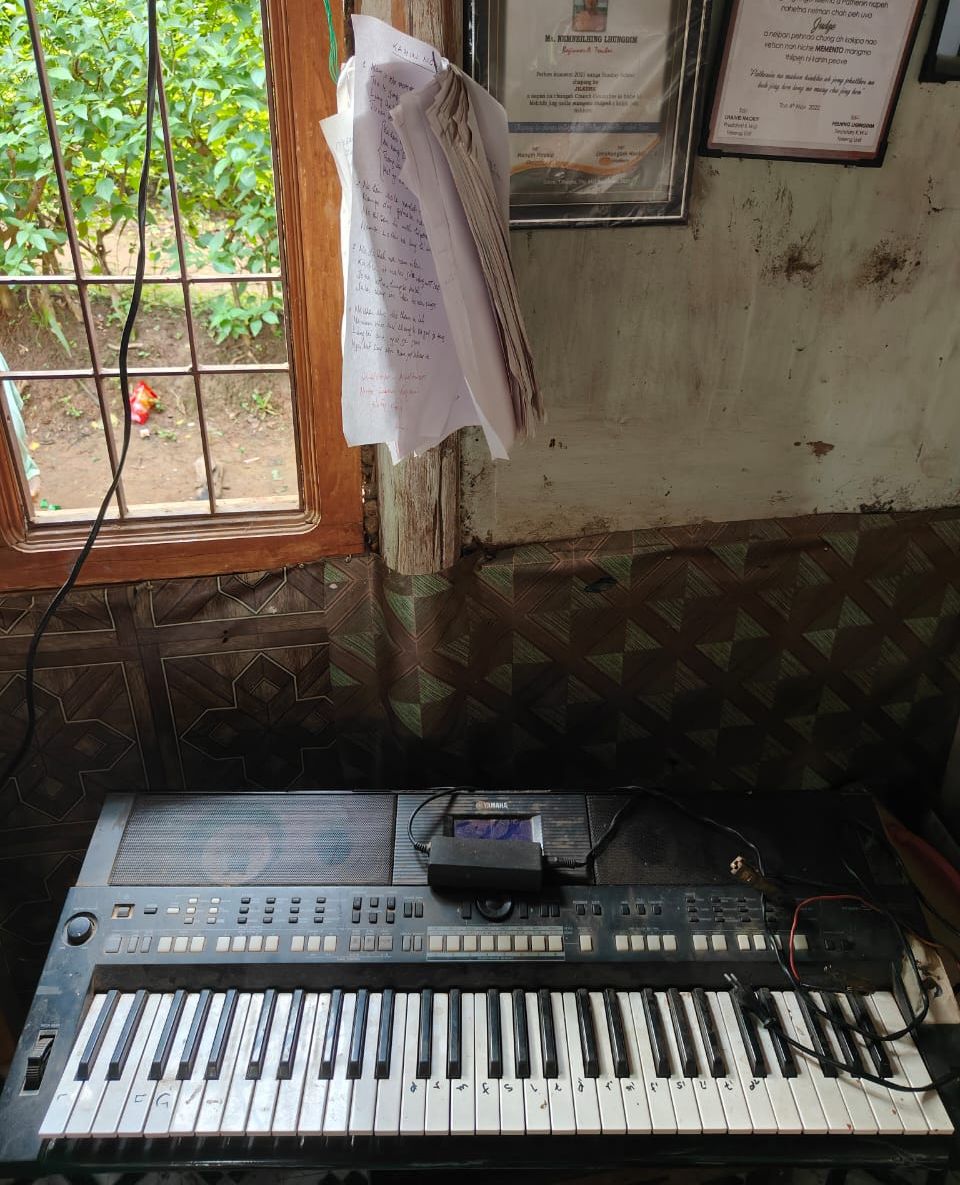
Article 14 spoke with the families of seven people—four Kukis and three Meiteis—who were killed. All seven were civilians before the violence erupted, but the unwillingness or inability of the government and security forces to end the conflict in Manipur made them take up arms to fight their own battles.
“My husband was an artist who wanted to express his emotions through his songs,” said Neimnilhing. “He never desired to wield weapons. However, the situation left us with no other choice because if we didn't defend ourselves and fight back, we would be killed, and women would be subjected to unimaginable horrors.”
“So, like many others, he had to set aside his dreams and profession to join the frontline and fight,” she said. “I am certain that if the government had wished, they could have ended it within 24 hours. But it has been over four months, so we have taken matters into our own hands."
Widely cited figures for the number of dead and displaced are 200 and 60,000, respectively, in deadly clashes since 3 May between the Meiteis, concentrated in the Imphal Valley, and the Kuki-Zo people in the hills. Scroll this month reported over 200 had been killed. The death toll provided by the Bharatiya Janata Party (BJP) government of Chief Minister N Biren this month was 175 dead.
In July, Reuters, citing government data, reported 181 people were killed, including 113 Kukis and 62 Meiteis, and 220 churches and 17 temples were destroyed. Other figures for churches destroyed have ranged from 249 to 360. According to the government, 254 churches and 132 temples have been destroyed.
The BJP government has failed to end the ethnic violence that erupted on 3 May. Chief Minister N Biren Singh and the local media are seen to have played a partisan role in favour of the Hindu Meiteis.
Old divisions are seen to have deepened under his leadership and his “war on drugs”, which has solidified and sharpened the narrative of Kukis being illegal immigrants from Myanmar engaged in poppy cultivation which leads to the production of brown sugar and other drugs that destroys the Meitei youth. They have also been vilified as people clearing protected forests and hurting the ecology.
The Manipur police registered a case under sections 153A (promoting enmity between two communities), 200 (using false declaration as true), 298 (deliberate intent to wound religious feelings), 295 (injuring or defiling a place of worship) and 505 (statements conducing to public mischief) of Indian Penal Code, 1860, against four journalists of the Editors Guild of India who produced a report saying that due to the internet ban at the peak of the conflict, journalists had to follow the government narrative, which under Biren Singh "became a narrow ethnic one playing up to the biases of the majority Meitei community”.
After more than two months of deadly violence, Prime Minister Narendra Modi was forced to break his silence after a video showing two Kuki women being paraded naked went viral.
When he spoke about Manipur in Parliament a month later, Modi was brief, saying the central and state governments would bring the perpetrators to justice and the country was with the women of Manipur.
“Manipur had become the victim of ethnic clashes during the erstwhile Congress regime,” said Modi. There was a time in Manipur when everything used to be run by insurgents. Whose government was it at that time?”
Biren Singh, in August, said the state was “limping back to normalcy”, but there have been two recent deadly bouts of violence as recently as 29 August and 12 September, killing 11 people. A police officer and a soldier who was on leave were also killed this month.
The Kuki-dominated Churachandpur and Meitei-dominated Bishnupur districts have experienced persistent violence, even with a four-layer security presence comprising the Indian Army, the Central Reserve Police Force (CRPF), the Border Security Force (BSF), and the Assam Rifles—paramilitary forces—located just three or four km away from the fighting.
"Our responsibility is to safeguard the borders along the main roads that separate the hills and the valley. We have not been granted the authority to enter the villages and approach their frontlines, where firing and violence occur almost daily,” said an army officer stationed in a buffer zone between the Churachandpur and Bishnupur districts, speaking anonymously.
“We can hear the sounds of gunfire, but we cannot intervene in those areas,” the officer said.
Lhungdim, survived by his wife and five children, died at three in the morning on 31 August while being evacuated from Khosabung village “frontline”, between Churachandpur and Bishnupur, to Aizawl, the capital city of neighbouring Mizoram, a 16-hour drive from the hill district.
Neimnilhing said he was hit by a splinter of a bomb thrown from across the border in Bishnupur district, a Meitei stronghold.
Seanboi Vaiphei, the deputy superintendent of the Churachandpur district hospital, told us they did not have adequate resources to treat him in Churachandpur. So with the help of some civil society organisations, he was rushed to Aizawl, a 16-hour drive from the hill district.
From Deadly To Deadlier
Between 29 August and 2 September, at least three bodies of Meitei men killed at Thamnapokpi village in Bishnupur district, a “frontline” between Churachandpur and Bishnupur districts, were brought to The Regional Institute of Medical Sciences (RIMS) in Imphal for an autopsy.
Speaking on the condition of anonymity, a senior official at RIMS told Article 14 that there has been a change in the type of bullet injuries from the beginning of the conflict until now; all three had died as a result of sniper bullet injuries used for shooting and killing from a much greater distance.
“This is alarming because initially, the bodies coming to us for autopsies mostly exhibited injuries from single or double-barrel guns,” the official said. “Now, more sophisticated weapons are predominantly being used."
On the other side of the border, the deceased was taken to Churachandpur district hospital for autopsies. A hospital official, speaking on the condition of anonymity, said the death of two Kuki men was caused by splinters from bombs or mortars, a rare occurrence.
“We have never received bodies in the past with mortar injuries, indicating the escalating level of weaponry and arms used in the ongoing conflict,” the official said. It is extremely perilous."
According to the government, 5,668 arms were lost from the state armoury, and 1,329 have been recovered.
Four FIRs (First Information Reports) from three police stations in Heingang, Porompat, and Imphal East filed between 4 May and 29 May, accessed by Article 14, showed the loot of sophisticated weapons like the AK-47 and Indian Small Arms System (INSAS) rifles and even mortar bombs.
The dynamics of the conflict have undergone a significant transformation on the ground, with more sophisticated weapons being used by both sides, people are convinced that security forces are taking sides and members of separatist militant groups operating since the nineties that fought for cessation from the Indian state. While the Kuki groups wound down hostilities by signing ceasefire agreements over the past two decades, the banned Meitei groups continued.
“The nature of the conflict has fundamentally changed,” said an army official in Imphal, speaking on the condition of anonymity. “Militants dying on both sides are buried or cremated there, and then, they are not even counted in the death toll. Only the bodies of common men are reaching the mortuaries.”
From Home To Frontline
In the Churachandpur district, where Kukis sought refuge after the violence in the Meitei strongholds of Imphal and Bishnupur, Article 14 met with families with at least one member serving on the frontline, including displaced families residing in the relief camps scattered across the district.
In the three training centres that Article 14 visited in Churachandpur on 4 September, operated by ex-servicemen, men and women undergo physical and arms training. They are trained to use various weapons, including single and double-barrel rifles and homemade explosives.
Men above 18 have been encouraged to "volunteer" for frontline duty, while women are assigned to roles such as food distribution and providing first aid at the frontline. Some individuals are tasked with administrative responsibilities such as managing the training camps, which double up as relief camps, and addressing the medical needs of displaced people.
There are approximately 115 relief camps in Churachandpur, providing shelter for over 22,000 displaced persons, according to civil society organisations in the area.
Article 14 visited ten relief camps between 25 August and 6 September.
Members of the Kuki community running these camps and training men, women, and young people said they felt they had to because the government was on the side of the Meiteis, who could “easily outnumber us and wipe us out in the war”.
We met with 30 displaced persons who said they had picked up arms.
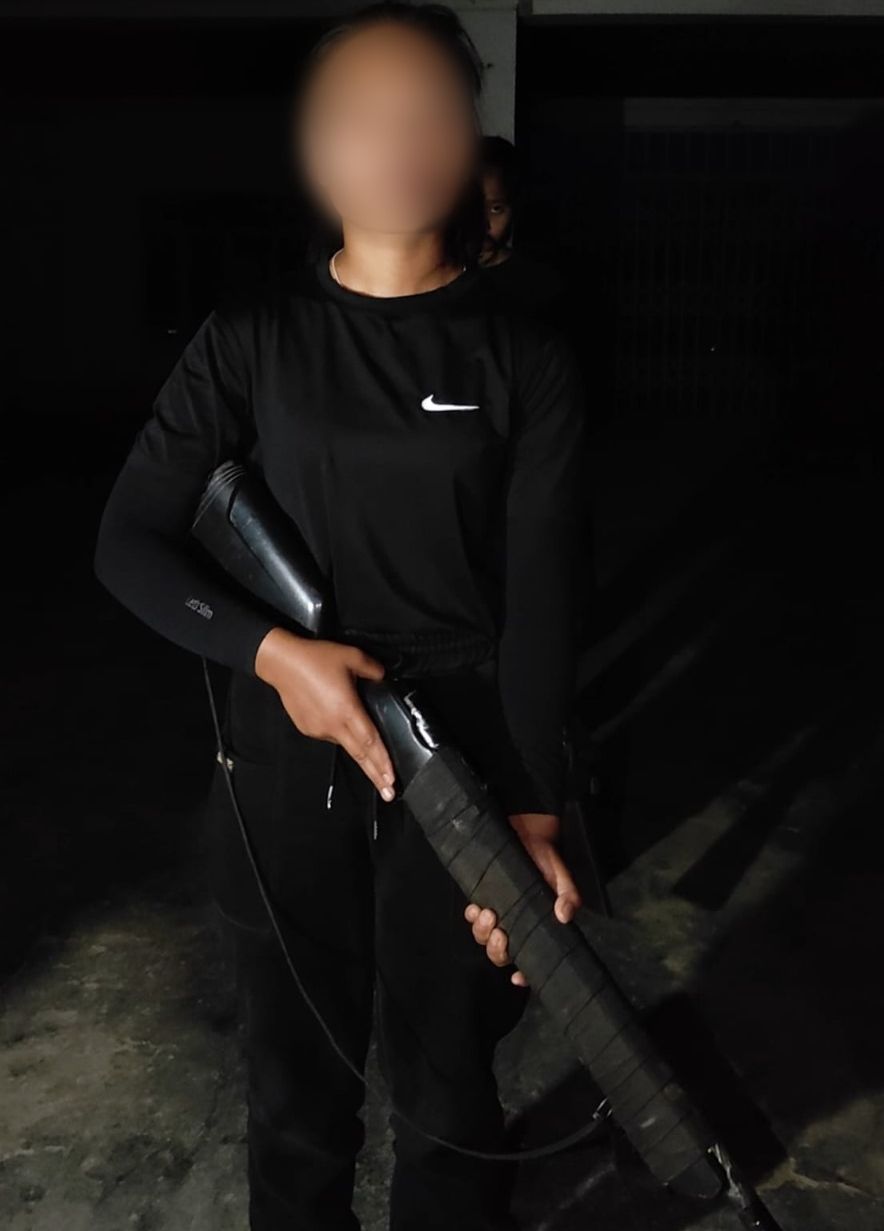
An 18-year-old, displaced from Kangvai village in Churachandpur, who was undergoing weapons training and speaking on the condition of anonymity, said she volunteered because of the absence of male members in her family—her younger brother is in school, and her father suffers from physical disabilities—but the line between her own will and coercion appears to be blurred.
Superintendent of Police of Churachandpur, Karthik Malladi, told Article 14 that he was not aware of any such camps but added he was aware that community members were giving each other physical and arms training with wooden and plastic guns.
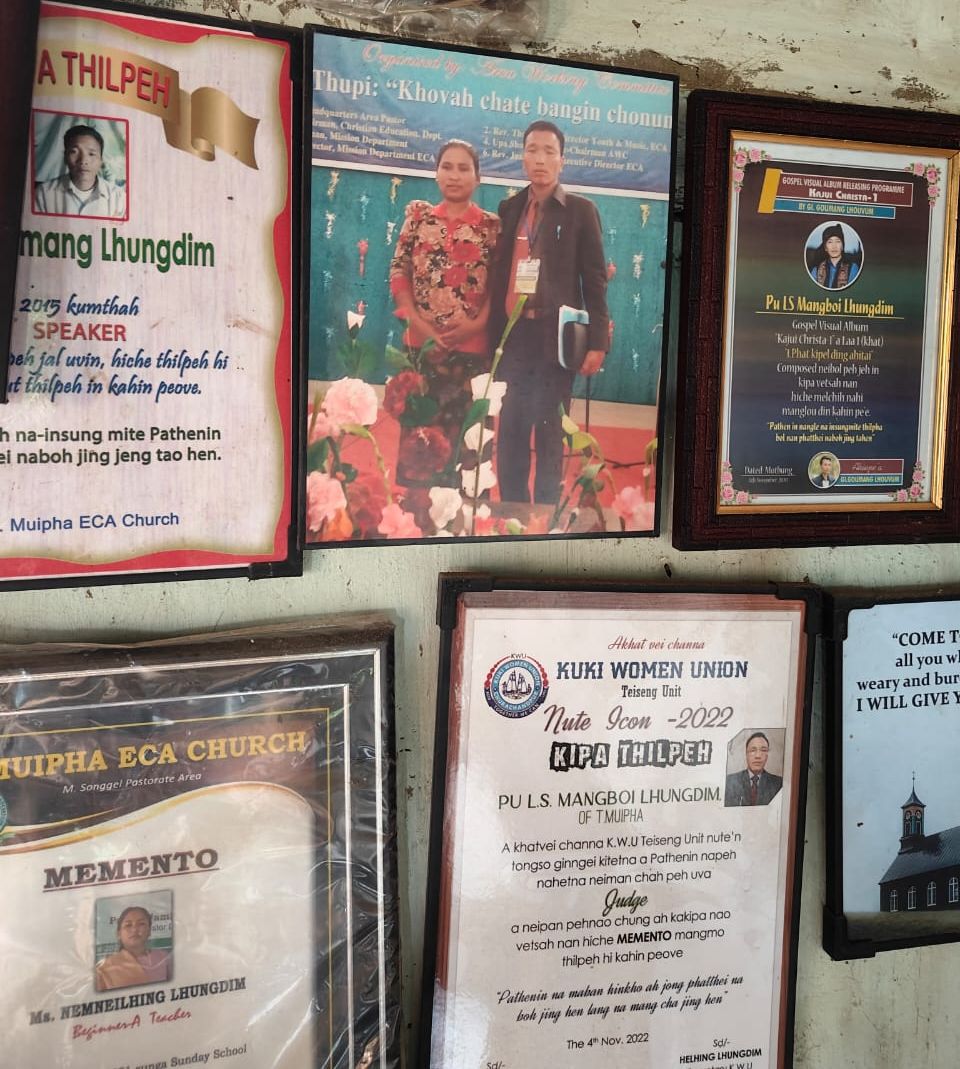
Death Of A Son
In a cramped room of a school building turned into a relief camp, Mangkholein Gangte, 80, looked at a photo of his 28-year-old son, Thangboi Gangte, who came to meet him on 30 August at the makeshift accommodation for four months. They had a long conversation about his marriage. The next day, he died in a crossfire at the frontline near the border between Bishnupur and Churachandpur districts.
Mangkholein Gangte had to identify his son's disfigured body at the morgue at the Churachandpur district hospital.
Before the family was displaced on 4 May, Thangboi Gangte used to work in a construction company in Imphal. His MA degree in political science was burnt when miscreants set their house in Songdo block in Churachandpur on fire. After shifting to the relief camp in the first week of May, Thangboi Gangte took arms training and went to the frontline.
"I was talking to my son about getting him married soon, and the next day, I saw my son with his skull lying open,” said Gangte.
“This is what the government is doing to us, letting us die. It should not have been my son's duty to defend his motherland, but he had no choice. Because if he did not go, people on the other side would have killed us one day,” he said.
After his eldest son died, the next of the three, aged 22, was sent to fight.
Across The Border
In Meitei-dominated Bishnupur, Meitei fighters are more discreet; this journalist was not permitted to use her mobile phone in the presence of armed militiamen.
Article 14 met with families whose loved ones had picked up weapons to fight the Kukis. Among them was a former member of a banned Meitei insurgent group operating since the early nineties, said locals. Moirangthem Ropen, a surrendered militant, according to locals, running a pork shop in west Imphal, joined the Meitei armed militia Arambai Tenggol weeks before he died at a “frontline” near Naranseina village between Bishnupur and Churachandpur districts. His family denied he was a surrendered militant, although they acknowledged he was a part of the Arambai Tenggol.
"My brother always wanted to sacrifice his life for his motherland. He used to drink a lot before the violence started, but ever since May 3, he quit drinking and regimented his life for the Meiteis,” said Moirangthem Rojit, 45, who is now taking care of his younger brother’s family—his wife and three children.
“His fellow fighters informed us on the evening of August 31 that a sniper bullet punctured his lungs, and he died on the spot,” he said. “His eldest son was doing his MA in Geography at the University of Manipur, but not after seeing his father's body. All he wants is to take revenge. He has not picked up his books.”
Adding that they were trying to counsel him, Rojit said, “But even we are angry, less on Kukis who killed my brother, more on the state and central government who are letting people die in Manipur and are watching this blood game as mute spectators."
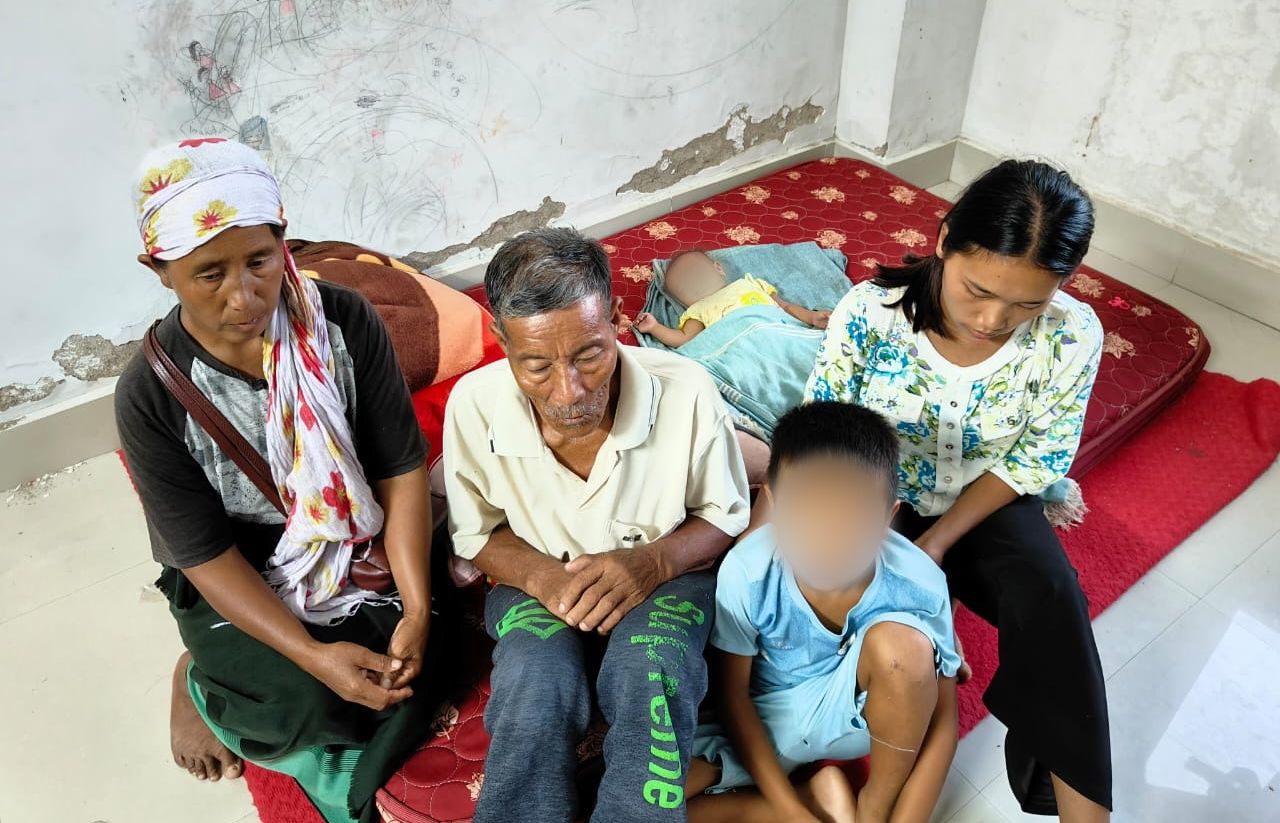
Death Of A Husband
P. Thoibi, 51, still cannot believe her husband is no longer with her. Their love marriage was a rarity in their time, and they had never spent a day apart since then.
On 30 August, P. Deveah, 54, was shot in the head and leg and became one of the casualties on the Meitei side to die on the Naranseina frontline, leaving behind his wife and three children. Before the outbreak of the violence, he worked as an ironsmith.
Despite their 31-year-old son being a member of the Manipur state police force, he supported his father's decision to take up arms and protect their community.
"My husband is a martyr. I know I will die soon without him, but I am happy that he died saving his land, his family, and the people of his community,” said Thoibi, her body wracked with sobs.
“My husband had hardly slept since the violence started in Manipur. He used to be in the bunkers all night, guarding the village,” she said. “I blame the Prime Minister and the Chief Minister for the affairs in Manipur. Our men should not be in a position to kill and die.”
(Tanushree Pandey is an independent journalist who has extensively covered human-interest stories and investigations from across the country and overseas.)
Get exclusive access to new databases, expert analyses, weekly newsletters, book excerpts and new ideas on democracy, law and society in India. Subscribe to Article 14.

